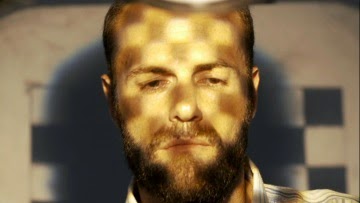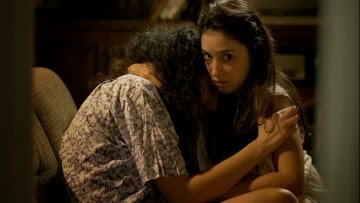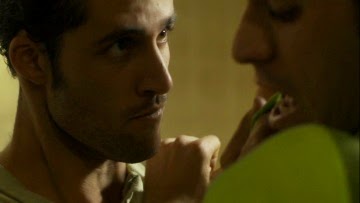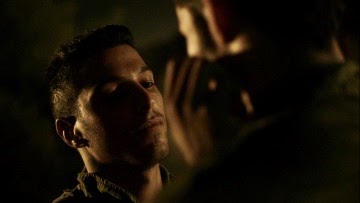

|
|
Snails in the Rain AKA Shablulim Ba'geshem
R1 - America - TLA Releasing Review written by and copyright: Eric Cotenas (15th February 2015). |
|
The Film
 In 1989 Tel Aviv, linguistics student Boaz's (Yoav Reuveni) life is fraught with uncertainty as he anxiously awaits notice of a scholarship to study in Jerusalem. He is living with his girlfriend Noa (Moran Rosenblatt) and is under the impression that they will get a place together in Jerusalem when he gets the scholarship, even though Noa has secretly applied to study architecture locally. His mother Ruth (Hava Ortman) seems to hold Noa responsible for the fact that Boaz has not proposed to her yet, and passive-aggressively demonstrates how she is better at caring for her son's needs. When Boaz starts receiving a series of anonymous love letters from a closeted gay man, he is disturbed by the memories they conjure up of his mandatory service in the Israeli Defense Forces in which the aggressive displays of masculinity of the other men first disturbed his sense of self. At first, Boaz wonders about the identity of the author who would have to be someone in a position to observe his routines, like the neighbor whose balcony faces his kitchen window, his mechanic who homoerotic jokes might have a deeper meaning, the librarian who picks up after him nightly, or a classmate whose strange glances he has only recently realized were a flirtation. As the weeks go on without word of the scholarship, and Boaz becomes estranged from Noa and his friends, he comes to depend on the letters which paint him in the writer's imagination as wise, kind, and self-assured but also desired. When Noa discovers the letters, she suspects that the writer is Boaz's linguistiscs professor Richlin (director Yariv Mozer) who they had observed on the street one day (only Boaz seems not to have realized that Richlin was cruising), she confronts the professor. Coincidentally, the writer's latest letter to Boaz asks him for a sign that he returns the affection or he will never be bothered again. Noa has also read this letter and is also waiting to see what Boaz will do. A deliberately-paced character drama and finely-rendered "period piece", Snails in the Rain is not the story of Boaz's sexual awakening, but of the continuing attempts of the young man to reject and repress his true desires. The fact that he is able and enthusiastic in his lovemaking with Noa surely assists his ability to deny a side of himself; but, as the film progresses, she becomes less of an object of desire and more of a means for him to prove his heterosexuality. The letters come a time in which he is already experiencing uncertainty about his future. The combination of the letters from his lonely admirer and the realization of his own interior isolation also start to make him aware of (but not entirely sensitive to) the loneliness of others. Boaz finds comfort in the romantic longing of a stranger but, while he is conscious of the potential changes his choice will have on Noa and his admirer, he is ignorant of Noa's knowledge (and possible complicity with the admirer before his final letter). A certain degree of selfishness is understandable and relatable in the navel-gazing that accompanies periods of uncertainty, but Noa and Boaz's admirer (whether it is Richlin or not) become elements of an existential crisis (alongside the scholarship) rather than actual people with feelings. A degree of uncertainty lingers for all involved at the end. Model Reuveni's looks are certainly a substantial part of his casting, but the newcomer actor is suited to the character's internalization and outward passivity, leaving much of the dramatic heavy lifting to Rosenblatt and writer/director/actor Mozer. The cinematography of (Shahar Reznik) bathes the film in warm tones representing not only the sweltering summer but also giving an air of nostalgia. I am uncertain about the cultural or historical reasons for the choice of 1989, but I doubt it has anything to do with state of technology as even now the "art" of letter writing is still considered a distinctive and intimate style of communication.   
Video
TLA-offshoot Canteen Outlaws' single-layer, progressive, anamorphic transfer features a suitable but not outstanding transfer of this attractively-shot film. Some edge enhancement is evident and detail is only fair, but the latter may have as much to do with the lensing of the film. It's about what we have come to expect from the company.   
Audio
The Dolby Digital 2.0 stereo audio track suits the dialogue-driven film. I'm not sure if it is the original channel configuration, but surround activity would probably be minimal (and more atmospheric rather than directional) if it was originally 5.1. English subtitles are hard-encoded into the image and always legible.   
Extras
There are absolutely no extras apart from trailers for My Straight Son and Floating Skyscrapers.
Packaging
The cover art is typically provocative; but, although this is a character drama, it does indeed feature plenty of scenes of Reuveni wearing very little.
Overall
|
|||||

|